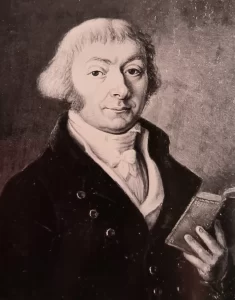Grongnet de Vasse
Fortia d’Urban
Marquis Agricol Joseph François de Fortia d’Urban (1756-1843) was a wealthy French mathematician and archaeologist. He was a member of several academies in western Europe.  He wrote a paper identifying Gozo, in the Maltese archipelago, as Ogygia, the abode of Homer’s Calypso. In a massive 10-volume work, Histoire ancienne du globe terrestre[1314], volume 9 has an essay that links the floods of Noah and Ogyges with the sinking of Atlantis.
He wrote a paper identifying Gozo, in the Maltese archipelago, as Ogygia, the abode of Homer’s Calypso. In a massive 10-volume work, Histoire ancienne du globe terrestre[1314], volume 9 has an essay that links the floods of Noah and Ogyges with the sinking of Atlantis.
Fortia d’Urban was a contemporary of Grongnet de Vasse, another early champion of a Maltese Atlantis. They met in Rome and later corresponded on the subject.
>>In October 2021, Laura Tabone published a paper on the Ancient Origins website that offered some interesting background information about the life of de Vassé. Tabone refers to accusations that Grongnet was involved in a hoax to support his Atlantis theory, but concluded that “It’s not known why Grognet would have involved himself in such a complex hoax. As a former abbé and the designer of a grand Catholic church, it seems rather incongruous that he should behave in such a way. His ideological persuasions under Napoléon also make it seem as though his character was one of principle.”(b)<<
Controversy has arisen regarding Eumelos of Cyrene, which Fortia d’Urban and Grongnet de Vassé was implicated in. A claim of hoax was made by Thorwald C. Franke in a paper on his website(a). Anton Mifsud wrote a rebuttal(e) in which he pointed out errors of fact in Franke’s original article, which have not been responded to. Instead, Franke has, most unsatisfactorily, just left it to readers to decide on the truth!>>Some will see this as a ‘cop-out’!<<
>>Nevertheless, in August 2024, Franke resuscitated the debate with a claim that his view of de Vassé had received some endorsement from Professor Ingrid D. Rowland of the Department of History at the University of Notre Dame of Indiana in a three-year-old book(c).
This induced Mifsud to produce an even more detailed defence of de Vassé(d).<<
(a) https://www.atlantis-scout.de/atlantis-malta-hoax.htm
(d) https://www.academia.edu/125030941/GIORGIO_GROGNET_DE_VASSE_forger_or_victim *
(e) https://atlantipedia.ie/samples/document-010114b/or (Archive 5145) *
